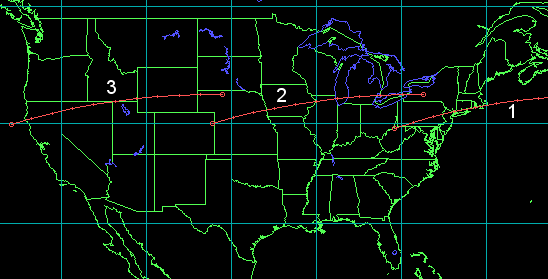|
These data were provided by satellite tracking expert Rob Matson, who notes that the flyby times discussed below are best estimates--uncertain by several minutes at least. To improve your chances of seeing the spacecraft "go outside 10 minutes early," he recommends. Shenzhou V will make three visible passes over the United States on Wednesday morning, Oct. 15th. The ground tracks are pictured below:  PASS #1: "For those in the Boston area," says Matson, "Shenzhou 5 (and its passenger!) should make a terrific pass Wednesday morning beginning around 5:57 am EDT, low in the WSW. It will be heading upward toward Taurus, passing 5 degrees to the lower left of the Moon, and culminating a bit higher than Saturn around 5:58:40 based on the following search elements kindly provided by Ted Molczan: Shenzhou 5 7.8 2.5 0.0 5.4 d 1 70001U 03288.67700930 .00036000 00000-0 19749-3 0 17 2 70001 42.4080 26.2791 0004797 163.8920 321.6647 15.78791273 101 "New York City will have nearly a zenith pass, while the pass as seen from Philadelphia will be very high in the north. Even from Washington, D.C., the pass will culminate more than 60 degrees above the NNW (around 5:57:15 am EDT)." PASS #2: "This one starts over southern Nebraska (11:28 UT) and heads across Iowa, northern Illinois--directly over Chicago at 11:31 UT!--southern Michigan, Lake Erie and westernmost New York at 11:33 UT. Wisconsin, Indiana, Ohio and northwest Pennsylvania will all have good views of this pass." PASS #3: "The spacecraft will make a pass low in the north tomorrow morning for the Los Angeles area beginning just before 6:00 am PDT. Look for Shenzhou 5 to come out of the earth's shadow directly beneath Cassiopeia about 17 degrees above the northwest horizon around 5:59:30 am. It will be moving left to right, and will pass about halfway between Polaris and the horizon t 6:00:30 am." "The pass will be much better for those near the San Francisco Bay area, with Shenzhou 5 making its appearance near epsilon-Cas (the highest star in Cassiopeia) at ~5:59:20, high in the northwest. 30 seconds later it will pass about 8 degrees above Polaris, heading for the center of the Big Dipper, just below the bowl." The spacecraft will make a similar pass over Reno, Nevada, shortly thereafter. Ground track coordinates at 30-second intervals for the three sunlit tracks across the U.S. on Wednesday morning: UTC Date UTC Time Latitude Longitude ---------- -------- -------- --------- 2003/10/15 9:56:30 39.5208 -80.8844 2003/10/15 9:57:00 40.0831 -78.5491 2003/10/15 9:57:30 40.5924 -76.1749 2003/10/15 9:58:00 41.0468 -73.7646 2003/10/15 9:58:30 41.4449 -71.3213 2003/10/15 9:59:00 41.7850 -68.8487 2003/10/15 9:59:30 42.0659 -66.3510 2003/10/15 10:00:00 42.2865 -63.8325 2003/10/15 11:28:00 39.9806 -102.2201 2003/10/15 11:28:30 40.5001 -99.8531 2003/10/15 11:29:00 40.9651 -97.4494 2003/10/15 11:29:30 41.3739 -95.0121 2003/10/15 11:30:00 41.7251 -92.5448 2003/10/15 11:30:30 42.0173 -90.0515 2003/10/15 11:31:00 42.2494 -87.5366 2003/10/15 11:31:30 42.4204 -85.0048 2003/10/15 11:32:00 42.5297 -82.4610 2003/10/15 11:32:30 42.5768 -79.9105 2003/10/15 11:33:00 42.5614 -77.3586 2003/10/15 12:59:00 39.8766 -125.8885 2003/10/15 12:59:30 40.4061 -123.5287 2003/10/15 13:00:00 40.8815 -121.1317 2003/10/15 13:00:30 41.3011 -118.7005 2003/10/15 13:01:00 41.6633 -116.2386 2003/10/15 13:01:30 41.9667 -113.7499 2003/10/15 13:02:00 42.2102 -111.2387 2003/10/15 13:02:30 42.3929 -108.7097 2003/10/15 13:03:00 42.5138 -106.1678 2003/10/15 13:03:30 42.5727 -103.6182 2003/10/15 13:04:00 42.5691 -101.0662 |